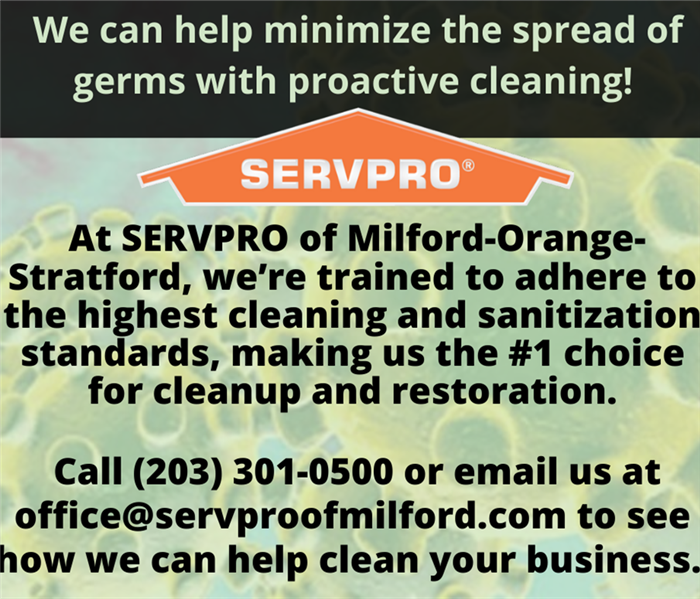Archived Biohazard Blog Posts
We are Still Open and Here to Help in New Haven County
4/13/2020 (Permalink)
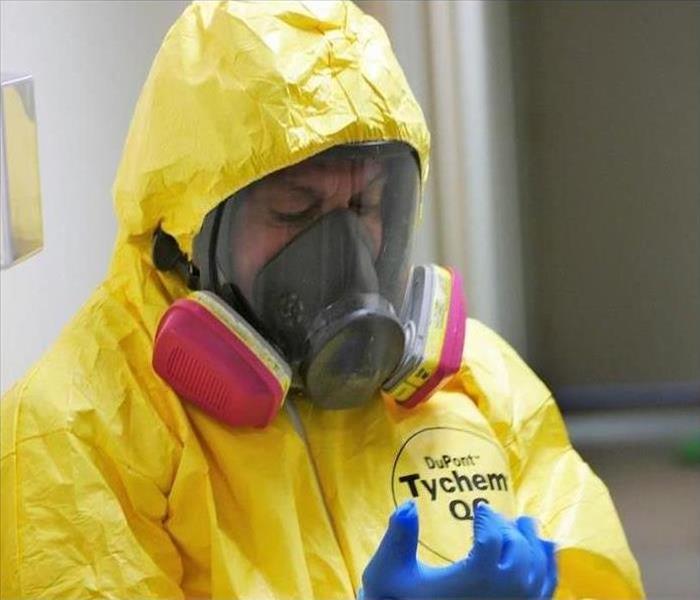 The SERVPRO of Milford-Orange-Stratford team sanitizes a commercial building.
The SERVPRO of Milford-Orange-Stratford team sanitizes a commercial building.
The Woodbridge, Connecticut area is mourning. As of today, 2,946 New Haven County people have been diagnosed with coronavirus and 119 of our residents have passed away due to the virus.
The owner, staff and crew of Milford-Orange-Stratford live and work here and are experiencing this pandemic alongside our customers. We are committed to staying open and remaining available to help our customers. The reality is that the pandemic has not slowed the amount of water and fire damage that occurs and our customers depend on us to be available to clean and restore their homes and businesses after damage.
For our customers safety as well as our crews, we are following a safety protocol at every job. This includes social distancing while on the job as well as wearing protective gear, including masks and gloves. We are wiping down all surfaces that we touch with SERVPROXIDE™, a hospital-grade disinfectant that has demonstrated effectiveness against viruses similar to SARS-CoV-2 on hard, non-porous surfaces.
Many business owners in the area have also sought our assistance in sanitizing their buildings as a precaution or after a positive coronavirus test of an employee or guest. Because most insurance companies are not covering coronavirus cleanup, we are offering an affordable service to disinfect structures. This consists of applying SERVPROXIDE™ via foggers to sanitize commercial and residential buildings. Please call our office at (203) 301-0500 for details and pricing on this service.
Our thoughts and prayers are with all of our friends and neighbors who have been affected by coronavirus.
SERVPRO is Here to Help During This Time of Need
3/16/2020 (Permalink)
During this unprecedented time caused by the global pandemic of coronavirus, this is a reminder to our customers that we are specialists in cleaning services, and we adhere to the highest cleaning and sanitation standards.
Specialized Training
We are prepared to clean and disinfect your home or business, according to protocols set forth by the Centers for Disease Control and Prevention. We have years of experience in dealing with biological contaminants, and we will go beyond the scope of work that regular janitorial staff perform on a daily basis.
The CDC encourages cleaning of high-touch surfaces such as counters, tabletops, doorknobs, light switches, bathroom fixtures, toilets, phones, keyboards, tablets and tables. Other spaces mentioned in the CDC’s guidance for commercial spaces include:
- Kitchen/Food Areas
- Bathrooms
- Schools/Classrooms
- Offices
- Retail Spaces
- Water Fountains
- Shelving/Racks
- Sales Counters
- Carpets and Rugs
- Stair Handrails
- Elevator Cars
- Playground Equipment
- Fitness Equipment
Specialized Products
The CDC recommends usage of a labeled hospital-grade disinfectant with claims against similar pathogens to the coronavirus. Multiple products in the SERVPRO product line carry the EPA-approved emerging pathogens claims. While there is currently no product tested against this particular strain of the coronavirus, we are following all guidelines as provided by the CDC and local authorities.
Call Today for a Proactive Cleaning
If your home or business needs deep cleaning services, call the experts today – SERVPRO of Milford-Orange-Stratford at (203) 301-0500.
Sources:
https://www.cdc.gov/coronavirus/2019-ncov/hcp/guidance-prevent-spread.html?CDC_AA_refVal=https%3A%2F%2Fwww.cdc.gov%2Fcoronavirus%2F2019-ncov%2Fguidance-prevent-spread.html
https://www.cdc.gov/coronavirus/2019-ncov/specific-groups/guidance-business-response.html
Sewage Backups Stink. The Clean Up Doesn't Have To.
1/14/2020 (Permalink)
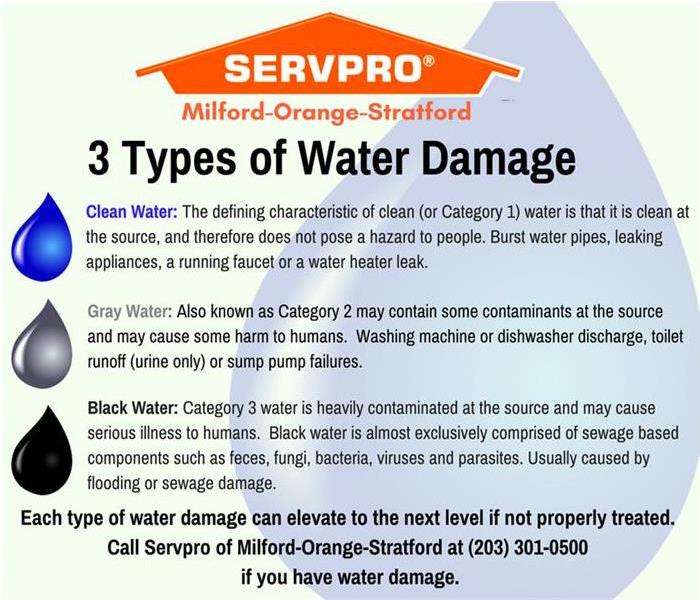 Toilet overflows and sewage backups contain Gray and Black water - both which require professional clean up.
Toilet overflows and sewage backups contain Gray and Black water - both which require professional clean up.
We know that when you have a toilet overflow or flood that contains sewage in your basement, you may be tempted to clean up the mess yourself.
Let’s face it, most homeowners would rather avoid an insurance deductible when possible. And, yes, there are times when flooding is minor enough that a homeowner can clean it up themselves. However, in the case of a toilet overflow or sewage flooding, we advise against this. It’s simply not worth the potential health risks.
Sewage is not clean water - it contains “gray” and even sometimes ”black” water. Gray, or CAT 2, water contains discharge from utilities such as sinks, tubs, showers, and dishwashers. Black, or CAT 3, water is what you have if there has been a toilet overflow with feces (which is often the case) or a sewage backup.
Sewage floodwater contains contaminants including parasites, viruses and bacteria. Touching sewage water without protective gear on can be a serious risk to your health. Improper clean up of Gray or Black Water can leave behind those contaminants and cause subsequent problems such as illness and mold growth.
As a professional restoration company with decades of experience, we restore your home by:
- Pumping out the sewage water and removing any remaining debris
- Removing wet and contaminated drywall, flooring and other structural material
- Using industrial dehumidifiers and air scrubbers to speed up the drying process
- Sanitizing the area using specialized cleaners and procedures; this helps eliminate bacteria and mold to prevent health risks and preserve infrastructure and belongings.
- Restoring your home to prime condition. Our Building Services team is available to replace walls, ceilings, flooring and even your entire bathroom if necessary.
Sewage backups stink. The clean up doesn’t have to.
Contact us for more information on how we can help.
Sewage Backups at New Haven County Commercial Properties
11/26/2019 (Permalink)
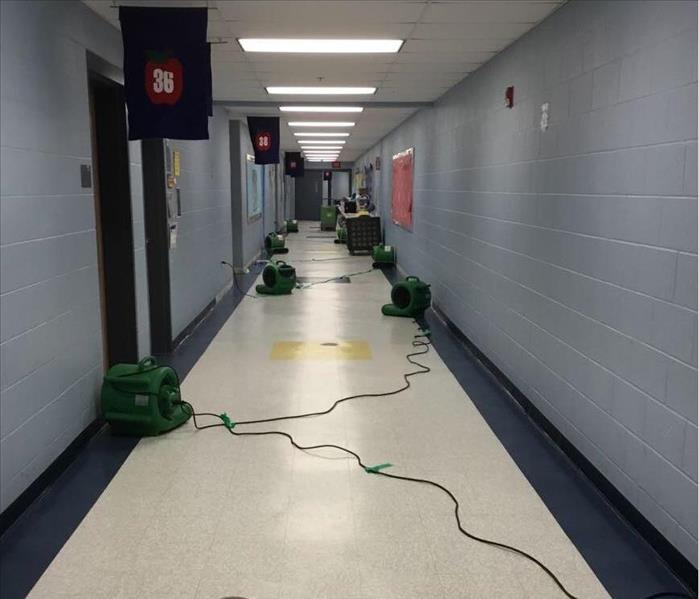 When a commercial property has sewage flooding, SERVPRO of Milford-Orange-Stratford is on call 24-7 to clean it up quickly and professionally.
When a commercial property has sewage flooding, SERVPRO of Milford-Orange-Stratford is on call 24-7 to clean it up quickly and professionally.
As we work to clean up sewage damage at a number of New Haven area properties this week - including an elementary school, an apartment complex and a big box store, it's a good time to discuss sewage damage at commercial buildings with our readers.
Even if you’ve never experienced sewage flooding firsthand, I’m sure the thought is unappealing to you. Not only are sewage backups filthy, they can also present a health hazard if not properly treated. It’s vital to get backups and overflows cleaned up quickly, professionally and completely. Many of the commercial property sewage backups that we treat are caused by toilet overflows in public restrooms, a public water main break or clog, a pipe collapse and misaligned plumbing. Flooding can also result when the volume of water runoff from a storm is greater than a drainage system’s capacity.
While there will always be scenarios when sewage flooding is beyond your control (such as a water main break), there are some preventative measures that can reduce your risk of commercial property damage.
- Have your sewer and plumbing systems inspected at least annually.
- Use a water pressure reducing valve to limit stress on your building's system.
- Add pop-up sewer release valves if your plumbing system does not already have them.
If you do have a backup, call us for immediate service. Our team is scheduled 'round the clock to respond to your emergency quickly.
Life in the Country: SERVPRO of Milford-Orange-Stratford Cleans and Sanitizes After Animal Waste Removal
10/7/2019 (Permalink)
 We love the Connecticut countryside but not when it moves into our homes!
We love the Connecticut countryside but not when it moves into our homes!
Sometimes when I drive through our area, I am amazed at how many rural areas still exist in New Haven County.
In fact, much of Connecticut is connected by old country roads with farms and homes. We are truly lucky to live in an area that has all of the comforts of society yet is surrounded by nature.
Of course, as a restoration company, we know that the country charm brings with it a unique set of problems. In particular, along with stone wall lined roads and open fields, county life is a perfect habitat for mice, squirrels, raccoons and bats, all of whom can cause thousands of dollars worth of damage when they enter a home.
It’s common for these creatures to find their way into garages, crawlspaces and attics and go unnoticed for weeks and sometimes months. Often, a homeowner doesn’t become aware that their home is infested until the rodent population has exploded and the scurrying becomes apparent through the ceiling. Other times, the smell of animal feces is a warning sign that there is a wild animal population living in your home. When it gets to this point, professional service is typically needed. You will most likely call an exterminator to come out and rid your home of the unwanted guests. Once they are gone, call SERVPRO of Milford-Orange-Stratford to clean up the mess that the animals have left behind.
You may wonder why you can’t just clean up the mess yourself, and in some cases, you can. However, there are a number of scenarios in which professional restoration is necessary because they might contain disease. For example, raccoon droppings contain parasites including roundworm. Rodent feces often contain the Hantavirus, which causes muscle aches, chills and lung damage when the disease fills them with fluid. Bird and bat droppings carry respiratory infections such as Histoplasmosis which has similar symptoms to the Hantavirus. These biohazardous droppings should be cleaned up and the affected areas disinfected.
Animals that move into your home often hide in the attic, behind walls and in corners. They chew drywall and make a cozy home in the insulation within your walls and ceilings. It doesn’t take long for the insulation and sheetrock to become saturated with urine. Any materials that have been exposed to animal urine and feces will need to be removed from your home and the area sanitized.
Whether you have animal waste in your basement or attic, our team has years of experience cleaning it up.We remove all damaged insulation, wood building materials and nests that have been left behind in a damaged state. Next, we spray the affected areas with cleaners and anti-fungal agents to ensure a healthy environment. Our team finishes the job with the installation of new insulation, walls and trim as necessary.
Hey, like you, we love the Connecticut countryside and all of the animals it contains. But, when they enter your home, we are here to help repair the damage.
Question From A Customer:Can I Clean Up a Toilet Overflow Myself?
8/27/2019 (Permalink)
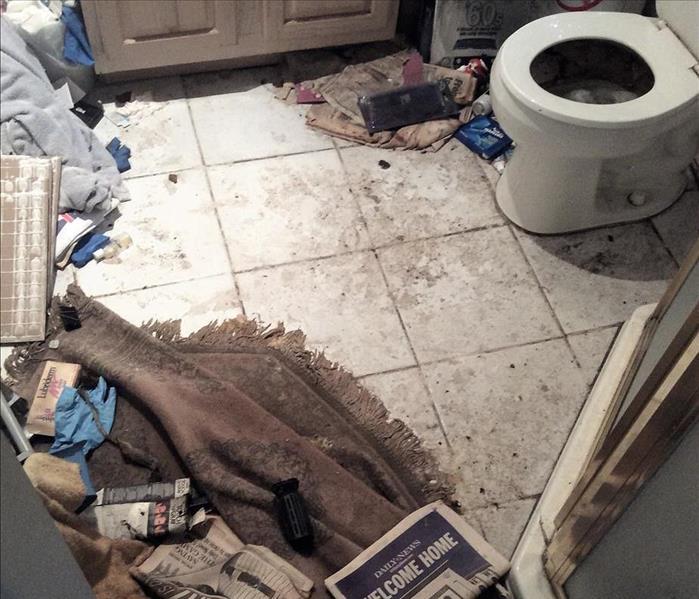 We recommend that you have your home professionally restored after a toilet overflow.
We recommend that you have your home professionally restored after a toilet overflow.
If you know us, you know we try not to be alarmists when it comes to water damage in homes and businesses.
We've seen what flooding as well as a failure to properly clean it up can do and we try to be as straightforward as possible with our customers about the treatments that we feel are necessary and unnecessary when they've had water damage.
If you've had flooding from a toilet overflow, our Production Managers will usually recommend that you have the mess professionally cleaned up. One of the common problems that we encounter when we discuss an overflow with a homeowner is that they underestimate the damage. In their minds, the water has been mopped up and there is no visible evidence of the flood aside from maybe damp baseboard molding or wet carpeting where the water seeped off of the tile flooring.
What our team knows from experience, however, is that the sewage damage is likely more widespread than it appears. In many cases, the water will run up or down the walls, which ruins the drywall and can create a hazardous electrical situation. Water often seeps under the bathroom cabinets and gets trapped there. The same goes for laminate flooring, which is a practical solution in bathrooms but of which water can easily penetrate. In our decades in the water damage restoration industry, we have seen the damage that untreated moisture behind walls and under floors can cause. Most obvious is mold, which can grow and spread unchecked when hidden behind a wall.
In addition to the structural problems that water from a toilet flood can cause, it might also contain pathogens that are harmful to human health. Without treatment from antimicrobial agents, bacteria and viruses are not removed from the surfaces although the water might be gone.
We know that it's tempting to take a few towels and mop up a toilet overflow however in this case, we do recommend that our customers give us a call and have us come and assess the situation.
Avoid a Septic Backup in Your New Haven County Home with These Tips
7/14/2019 (Permalink)
 If you have a septic backup in your New Haven County home, leave the cleanup to the professionals at SERVPRO of Milford-Orange-Stratford.
If you have a septic backup in your New Haven County home, leave the cleanup to the professionals at SERVPRO of Milford-Orange-Stratford.
Sewage backups are not only smelly and unsightly, they can also be dangerous.
Because sewage water can contain pathogens such as the E.Coli bacteria, salmonella and hepatitis as well as other bacteria, professional restoration is necessary when there is flooding from a backup.
There are some steps that homeowners can take in order to reduce their risk of a sewage backup. This will, in turn, save homeowners the nightmare of sewage throughout their home.
- Read Labels. Only use products that are safe for septic systems. Many products, such as household cleaners, are labeled that they are safe for septic systems.
- Never pour grease down your sink. This can clog your pipes and cause a backup. Remember your moms coffee can under the sink? Give your system a break and have a container handy that you can pour hot grease into
- Don’t plant trees or large shrubs directly above or near sewer lines as the roots can grow too large and break the pipes. Old cast iron or clay septic pipes often break down and crack. If possible, consider replacing your current sewer line with a new plastic pipe. This can prevent infiltration from tree and bush roots.
- Dispose of paper products properly. Not only might paper items such as paper towels,napkins and diapers clog your toilet, they often contain dyes which can be difficult for your system to break down.
- Install a backwater prevention valve. This is a fixture that allows sewage to leave but prevents it from backing up into your home, giving you the peace of mind that if something goes wrong, your home will be protected.
The time to take action and follow through with septic prevention steps is now. However, if you are reading this because there is already flooding in your home, give our Woodbridge office a call at (203) 301-0500 for immediate, professional service.
What Causes Sewage Backups and How Avoid One in Your Milford Home
7/23/2018 (Permalink)
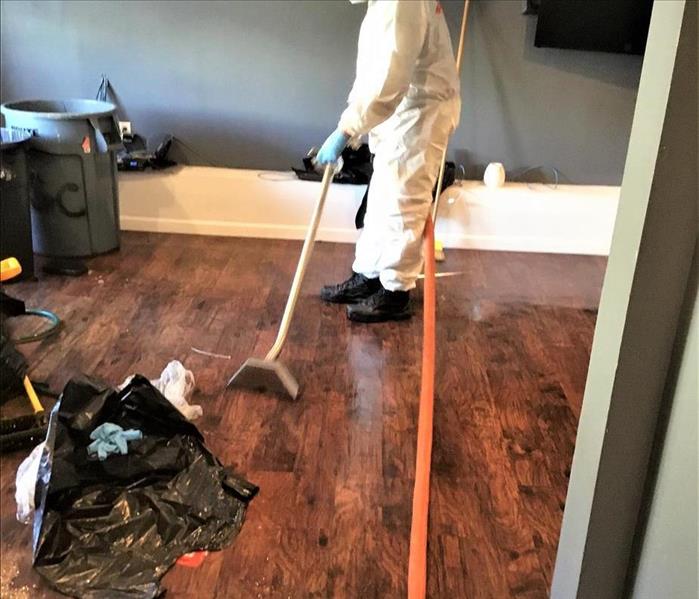 After a toilet overflowed due to a clogged pipe in Fairfield, SERVPRO of Milford-Orange-Stratford cleaned up the job.
After a toilet overflowed due to a clogged pipe in Fairfield, SERVPRO of Milford-Orange-Stratford cleaned up the job.
After a sewage backup at your home, your floors and the bottom of your walls may become saturated with sewage, as well as any household items such as bathroom cabinets that may have gotten caught up in the flood. Water from sewage is considered black water because it may contain bacteria and viruses. It is pertinent that if you have a sewage backup, it is cleaned up quickly and by a professional restoration company to reduce the risk of contamination spreading.
Knowing the causes of sewage backups can help you to avoid one.
Causes of Sewage Backups
- Clogs – If your home's drain pipes get clogged, you might have a backup.Aside from objects that shouldn't be flushed down the toilet,hair, grease, or other solid materials that end up in the drains can also create a clog.
- Tree Roots – Trees can grow really long roots that intertwine with your sewer line. Roots can grow into a pipe and cause holes or crush the sewer line by growing around it. Even if the roots in your yard are not the problem, roots from nearby trees can reach your sewer line and damage it.
- Damaged Sewer Lines – Most susceptible to sewage line malfunctions are older pipes (pre-1950) which are made of cast iron or even clay. Aging sewage systems can break down and crack, which can cause sewage backups and flooded basements. Newer homes usually have plastic sewer pipes, which are easier to install and handle however are more susceptible to breaking.
- Heavy Rainfall – If you are on a public sewer system, a large amount of rain can overburden your city’s sewer lines. If the public sewer can’t handle excess rainfall, the water can make its way into connected sewer lines, including the ones in your home. If you have a septic system at your home, it can be flooded by heavy rain as well and cause it to backup into your home.
How to Prevent Sewage Backups
- Don’t pour grease down the drain. Cooking oil can harden within your pipes; it gradually stops debris from draining, creating a clog. To properly dispose of grease or fat, pour it into a heat-resistant container and throw it in the trash after it cools off.
- Add drain traps. Insert drain baskets or strainers to catch solid objects and foods that might not easily break down.
- Dispose of paper products properly. Flushing hygiene products such as paper towels, diapers, or feminine products down the toilet can easily clog your sewer line. Save yourself some trouble and discard paper products in the trash.
- Cut tree roots.If you discover that tree roots are growing dangerously close to your sewer lateral, take the preventative measure of cutting the tree roots.
- Install a backwater prevention valve. This fixture allows sewage to leave but prevents it from backing up into your home. Backwater valves are typically installed into a sewer line and sometimes into a drain line in the basement.
- Clean your drains. An easy way to keep those drains clear, use an enzyme treatment or flush with one cup of baking soda followed by one cup of white vinegar and warm water on a monthly basis.
We Restore Homes After Sewage Backups and Toilet Overflows in New Haven County, CT
5/29/2018 (Permalink)
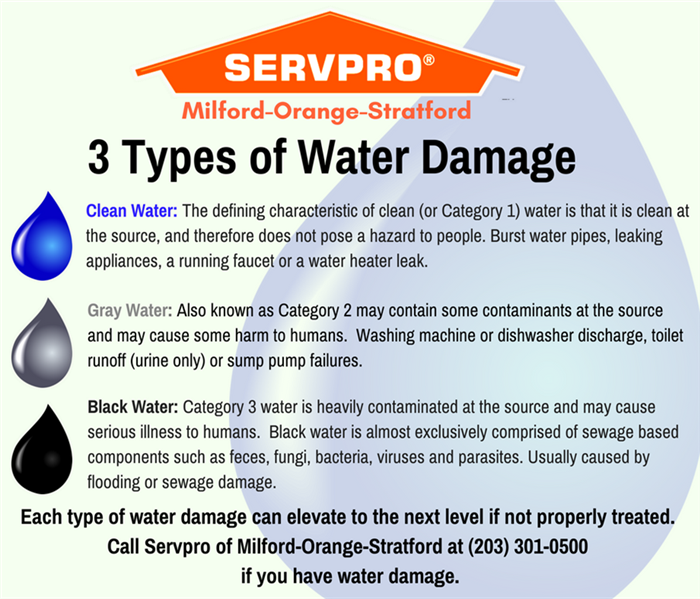 Sewage water from septic tank backups and toilet overflows is considered black, or category 3, water.
Sewage water from septic tank backups and toilet overflows is considered black, or category 3, water.
Sewage damage is one of the worst types of water damage that can occur in your home or business.
Whether it be from a municipal sewage backup, a clogged and overflowing toilet or a septic system failure that causes a backup, sewage water is considered to be Category 3, or black, water. Category 3 water is contaminated, can cause severe illness or death if ingested and any contact with it should be avoided. Examples of black water includes water that originates beyond the toilet trap and standing water that has begun to support microbial growth. A sewage backup should always be taken seriously due to the potential viruses, bacteria and harmful microbes it may contain.
If you have water damage from sewage in your home, a plumber should be called as well as a professional restoration company that specializes in restoring water damaged properties and has the training needed to clean up black water properly. When faced with a sewage damage disaster, never enter the damaged area without proper protective equipment, rubber boots, gloves, goggles and complete body cover. Do not try to clean up and repair area yourself.
What Causes Sewage Damage in Milford Homes?
There are many different causes of sewage damage in the home however at SERVPRO of Milford-Orange-Stratford, we see a few causes repeatedly.
Clogs in pipes leading to the toilet cause a back-up that can spread beyond the bathroom. A good solution to help prevent this if you have a septic system is to make a regular habit of pouring a natural enzyme treatment into your toilet on a weekly basis. Another common cause that we see is when the toilet itself malfunctions, causing an overflow.
Septic system backups can be caused by damaged pipes that have been broken by tree roots or a heavy object, such as a car or truck, being driven over them. Know where your septic system and leach field are located and use caution when doing yard work or home remodeling. Never drive over a vehicle or heavy machinery your septic system or leach field. Thankfully, a ride on lawnmower will not damage your pipes. Do not plant bushes or trees near your septic system and if there is a tree growing a little to close, consult a professional to see if the roots are a threat to your pipes.
If you have a toilet overflow or septic backup, give us a call at (203) 301-0500.





 24/7 Emergency Service
24/7 Emergency Service

